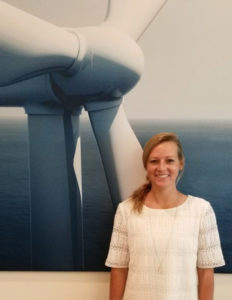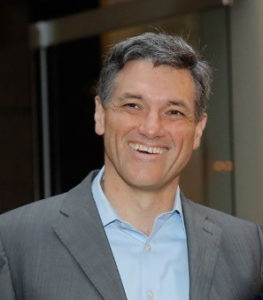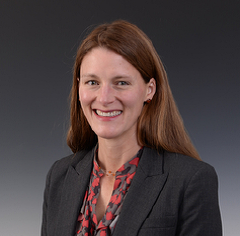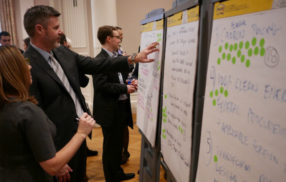
Through Wind, Sun and Water, Darden Alumni Chart a Cleaner Energy Future
By Dave Hendrick
Once dwarfed by coal and natural gas, the renewable energy sector continues to increase its share of the mix of U.S. electricity generation. According to data from the U.S. Energy Information Administration, renewables made up about 17 percent of electricity generation in 2017, and its share will continue to grow through 2040, which will be critical to reduce carbon emissions in a sector responsible for nearly 30 percent of all U.S. greenhouse gas emissions.
The growth ripples through the economy and labor market in countless ways. Solar photovoltaic installer and wind turbine service technician are the country’s No. 1 and No. 2 fastest-growing occupations, according to the Bureau of Labor Statistics.
With climate change serving as one of the biggest global challenges on the minds of MBAs at the University of Virginia Darden School of Business, interest in clean energy at the School is evident, from a concentration in Innovation for Sustainability to thought leadership emanating from the Business Innovation and Climate Change Initiative to growing student interest in the popular Energy Club.
There are also scores of Darden alumni working in all facets of the industry, from well-funded startups like Husk Power Systems, which was founded by Manoj Sinha (MBA ’09) and turns biomass into energy throughout rural India, to established entities like Abundant Power, which is led by CEO Shannon Smith (MBA ’90) and delivers energy efficiency solutions to the built environment.
Below, Darden presents three stories of students and alumni working in radically different areas of the clean energy space at a time of dynamic growth.
Taylor Sheppard
Taylor Sheppard (Class of 2019) came to Darden with the intention of furthering a career in the energy space, a sector she already knew well.

An active duty officer in the U.S. Navy, Sheppard was a nuclear engineer on a submarine, running missions and watching the momentum swell around a clean energy future within the armed services as she planned for her next career move.
“The energy sector is changing right now, and with the accelerated shift to clean energy I think we’re going to see a lot of continued movement in the military towards renewable power and a more sustainable future.” Sheppard said. “I really wanted to get my MBA, especially at Darden.”
Once at Darden, Sheppard began recruiting for energy and finance positions, and found the ideal combination of the two through an analyst position with the Charlottesville, Virginia-based Apex Clean Energy — a fast-growing renewable energy company that employs multiple Darden alumni and develops and operates large-scale wind and solar facilities across the U.S.
The firm has national reach and influence but is small enough to afford a dynamic, hands-on internship program, said Sheppard, who was joined by Itay Ron (Class of 2019) in the Apex internship program over the summer.
Sheppard said she sees signs of growing interest in the space at Darden, with a dynamic and growing Darden Energy Club and growing network of alumni in the field.
“It’s been a niche industry here at Darden, but with Charlottesville in general being a big mover in the energy industry, and now with alumni coming back and recruiting at Darden, we’ve seen a lot of prospective students choosing Darden specifically with a goal of pursuing energy jobs,” Sheppard said. “It’s getting big, and I think next year’s [Energy Club] board is going to do a really good job getting involved in the community and increasing awareness about what the industry’s doing.”
Sheppard, a competitive open-water swimmer and outdoors enthusiast, will return to the Navy after graduation, likely continuing her work as a nuclear engineer. After that, Sheppard hopes to parlay her expertise into a new career.
“My goal is to transition into the energy industry and hopefully become a liaison between the military and private sector, helping the Navy move toward more of a clean energy focus,” Sheppard said.
Eran Gartner
Eran Gartner’s (MBA ‘92) high-speed career in train building detoured for an unexpected stop in the Israeli desert, where he currently leads the construction of one of the world’s largest solar power plants.

It was not where Gartner expected to find himself following a 25-year career in transportation and energy infrastructure that began in Zurich and included stops in Berlin, the U.K. and Paris.
“After Darden, I went off to Europe and spent 20 years living my career dream of building some of the world’s most sophisticated train systems,” Gartner said. “What helped me rise through the ranks was the fact I was that rare animal — an engineer with an MBA.”
As a young manager at the industrial technology company ABB in Zurich, Gartner said he was plucked from obscurity for a high-potential track thanks to his “unique selling proposition:” he possessed strategic planning skills, courtesy of his Darden MBA education.
Rising through the ranks amid a series of mergers and acquisitions, Gartner eventually led a global manufacturing network for rail giant Bombardier and served as president of the systems division and its 2,500 employees.
Gartner’s career pivot to the renewable energy sector came when he closed out 20 years of rail experience by moving to a new role at Alstom Group in Paris. As Alstom’s senior vice president of strategy, his analysis helped the CEO crystallize his view that the company should divest its power and grid business, which it did in 2014 in a $12 billion transaction with General Electric.
In part out of a desire to return to Israel after spending years there as a child, Gartner signed on to lead one of Alstom’s former projects, the Megalim concentrated solar power plant, a massive complex that will eventually supply 121 megawatts of renewable power — enough to power 40,000 homes — to the national grid in Israel, representing a key part of the Israeli government’s climate change commitments to product 10 percent of its electricity from renewable sources by 2020 and 17 percent by 2030.
The plant, a joint venture owned by Noy Fund, BrightSource and GE Renewable Energy, uses a solar thermal technology that was once cost competitive with solar panels, but has fallen behind in the cost race — a pitfall of operating in a sector defined by rapid innovation and nascent technologies.
“Solar PV panels have continued on an unimaginably impressive trend of cost reduction and performance enhancement,” said Gartner. “Unfortunately, it makes other solar technologies look less attractive in comparison.”
Still, the energy the project produces will be 100 percent carbon-free, and Gartner said he is “bursting with pride” at the project and its high-visibility role increasing Israel’s green energy footprint and reducing carbon emissions.
Gartner isn’t sure what the future holds after the Megalim project is complete. He said he has never taken his finger off the pulse of the global rail industry, although he’s open to continuing down the path of renewables, given the right circumstances.
Said Gardner, “You have to find the right place in the value-chain of rail transportation, renewable energy or any major infrastructure in order to land on the profitable side of the equation.”
Dorothy Sosnowski
Dorothy Sosnowski (MBA ’00) had impeccably poor timing when she moved to Portland, Oregon, after Darden to take a position with Enron Broadband Services, shortly before the company imploded in the largest corporate bankruptcy in U.S. history.
What promised to be a dynamic telecom position became instead a salvage project, with Sosnowski transferring to then Enron-owned Portland General Electric and ultimately helping to sell off various businesses the company had amassed in communications infrastructure — and eventually selling her way out of her initial job.
Working in resource planning, however, a new and unexpected career in clean energy was born.

Sosnowski helped devise a finance mechanism that allowed utilities like Portland General Electric to get into the solar sector and use federal tax credits — an area that had been tough to crack due to the restrictions of utility regulations, which put regulated utilities at a disadvantage to independent power producers.
“This is where my Darden project finance background came full circle, because we were able to use structured finance to find a way for utilities to own these projects and get the tax benefits,” Sosnowski said.
Sosnowski became the utility’s first solar program manager, helping to build a network of grid-connected solar projects in the state.
Sosnowski moved on to the commercial solar developer Smart Energy Capital, which was eventually purchased by NextEra Energy, the country’s largest owner of wind and solar power. There, she played a direct role in project development, doing everything from “finding the piece of dirt” to negotiating long-term contracts for power from new projects, and eventually helping to construct solar projects across the country, including a major facility serving three military installations in Hawaii.
After years with the large, publicly traded NextEra, Sosnowski recently joined the startup Natel Energy, which is seeking to inject innovative thinking and resources into hydropower. As vice president of development, Sosnowski leads the team trying to place the company’s turbines in nonpowered dams and irrigation canals across the country.
The company has been awarded more than $1.5 million from the U.S. Department of Energy to help further its designs and deployment.
“This is a chance to learn something new, do something different, lead a larger team and really have a bigger impact on what has been a slow-moving industry,” Sosnowski said.
Although renewable sources of energy are still comparatively small compared to fossil fuels when zooming out to look at all forms of energy use, their march has continued largely unabated, and Sosnowski called it an “incredibly exciting time” to be working in the industry.
“So much is changing, and it’s really threatening traditional utility business models,” Sosnowski said. “You’re seeing states like Hawaii come out with 100 percent renewable energy goals, and I think that’s more possible than it’s ever been.”
Although hydro, wind and solar represent completely different means of generation, Sosnowski said a camaraderie and culture of mutual support exists throughout the renewables sector.
“Even though there’s lot of competition, it’s a very friendly and open industry because we all face the same issues and benefit from working together,” Sosnowski said. “I absolutely love what I do.”
The University of Virginia Darden School of Business prepares responsible global leaders through unparalleled transformational learning experiences. Darden’s graduate degree programs (MBA, MSBA and Ph.D.) and Executive Education & Lifelong Learning programs offered by the Darden School Foundation set the stage for a lifetime of career advancement and impact. Darden’s top-ranked faculty, renowned for teaching excellence, inspires and shapes modern business leadership worldwide through research, thought leadership and business publishing. Darden has Grounds in Charlottesville, Virginia, and the Washington, D.C., area and a global community that includes 18,000 alumni in 90 countries. Darden was established in 1955 at the University of Virginia, a top public university founded by Thomas Jefferson in 1819 in Charlottesville, Virginia.
Press Contact
Molly Mitchell
Senior Associate Director, Editorial and Media Relations
Darden School of Business
University of Virginia
MitchellM@darden.virginia.edu







